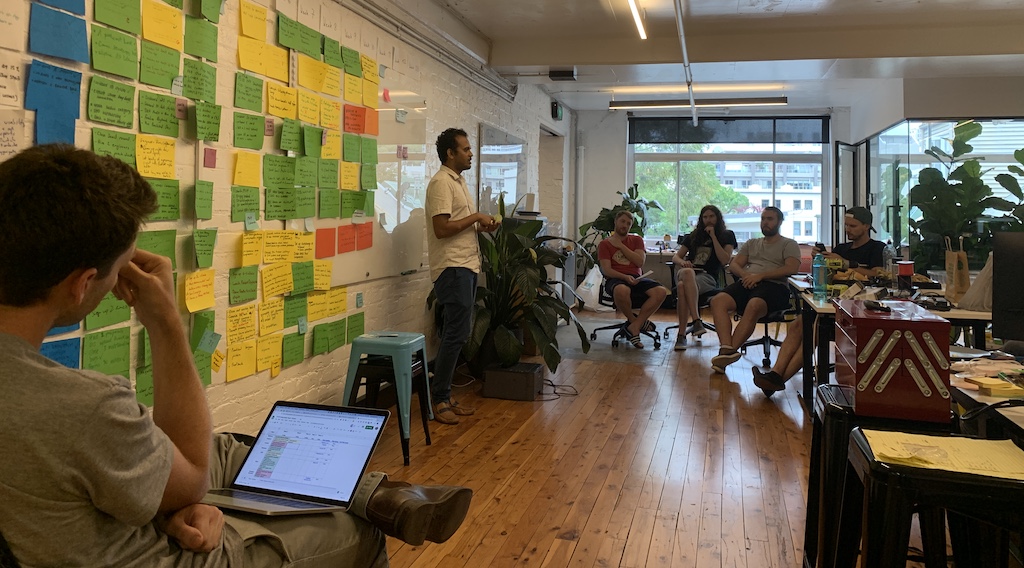A few people have asked me about my work with Startmate, Australia’s leading startup accelerator1, and how they can get involved with investing in or mentoring startups.
Today I wanted to answer this and share a bit about how I engage with startups as a mentor/advisor in Startmate.

How can you get involved?
A startup incubator is a great place to start because it provides a way to connect with the startups, filters them for quality, and allows you to invest as well.
I started with Startmate by applying to be a mentor, where I invested and joined to mentor the Melbourne cohort in 2018. Incubators/accelerators like Startmate work by the mentors putting money into a fund (minimum $10k per round), which is then invested in the startups.
Startmate also hosts “office hours” for mentors, which are 30 minute Zoom calls with founders arranged in a block. Participating as a mentor there can help build your network of founders and meet people outside the incubator.
Alternatively, you could advertise your availability as a mentor/advisor on LinkedIn. A few people have reached out to me on LinkedIn since I added startup advisor to my bio there.
Another approach is to find teams yourself and offer to help them out. One team I now advise I found initially via their YouTube videos. After a few chats and a visit, I offered to lead an angel investment for them.
When you reach out to an incubator or advertise yourself on LinkedIn, the first question you’ll be faced with is - what can startups learn from you?
Do you have relevant experience?
Startup founders want to learn from people who have been in the same situation before, or who can help them make progress quickly. The typical categories of startup advisors are:
- Other founders - help with starting the business, hiring early employees, what to focus on/ignore.
- Investors - help with identifying what the company needs to get venture funding (hint: a product with customers and revenue!), or by actually giving them money.
- Domain experts - this could be people in a particular industry (e.g. doctors for a medical startup), or people with particular skills (e.g. CTOs for a software startup).
If you’re not a founder, an investor, or an expert in something immediately relevant to a startup, you should probably find something else to do with your time.
If you're not a founder, an investor, or an expert in something immediately relevant to a startup, you should probably find something else to do with your time.
In my case, I’ve found my experience as an early employee at Atlassian is occasionally useful, but not as useful as the experience of mentors who have actually been founders. So the main thing I bring is my skill with product and software development – helping teams identify their customer needs and working with devs to turn those into working, viable products.
The gotcha with having specific expertise like this is that you’ll need to spend a fair bit of time to get to know the startup and their industry, to make sure your advice is relevant. So the next question is whether you want to make that commitment or not.
Can you spare the time and focus?
Startup incubators often emphasise how little time it takes to be involved as a mentor, and they do a lot of work to make things easy for us. But I’ve found that I have to spend more than the minimum time to get the most out of mentoring, both for the startups and for myself.
I've found that I have to spend more than the minimum time to get the most out of mentoring, both for the startups and for myself.
My typical approach to mentoring in Startmate starts with the applications:
- Reviewing applications (5-6h). I typically spend 5-6 hours one evening reviewing Startmate submissions and voting on them. This includes looking at websites, pitch views and reading details about dozens of teams to try to find the best ones. Startmate was getting over 200 applications when I was a mentor, but I could only review perhaps 20-30 in one night.
- Interview Day. The most important event to attend for Startmate is Interview Day, where the top 30 teams who applied will attend (or meet over Zoom, more recently) to give their pitch to you. As a mentor, I find it helps to spend a bit of time in addition to the day itself.
- Interview day prep (3-4h). The night before interview day, I look through my interview schedule and look up each team’s website or application. Then I jot down questions I can ask them so, rather a rehearsed pitch, we can jump straight into the meat. How many customers do they have? What is their go-to-market strategy? Which competitor are they most worried about? This takes 3-4 hours.
- Attend interview day (3h). Interviewing 15 teams for 10 minutes each takes 3 hours, so this is gruelling but incredibly fun. During each interview, I take notes on good and bad aspects, looking for teams that are high functioning and going after a good opportunity. The key question: would I invest my own money in this company?
- Send follow-up emails (2h). After interview day, I have usually found a couple of startups that I personally connected with. I jot some of my thoughts in an email and send it over to the founder, so they have some impartial feedback on their company, even if they don’t make it into the actual incubator. This takes about 1-2 hours to write and send 3-4 detailed emails.
By the time the teams are selected for inclusion in the cohort, I’ve usually worked out which teams I want to spend more time with. In the most recent cohort, Startmate introduced the idea of a “squad”, which were a designated group of mentors for each company. So in this round, the teams I focused on were my two squads, each with a weekly meeting, and three others I met with occasionally through the program.
Mentor activities throughout the program include:
- Reading weekly updates. Each team send a weekly update on their progress, including metrics and good/bad/ugly happenings for their company. At the start of the program I read all of them, to get familiar with each team, and later on I focus on the ones I’m following most closely.
- Squad meetings. The squads I participated in for Startmate MEL/NZ 2020 had weekly meetings for most of the program, and this was quite helpful for keeping up to date in Covid times, when we could only meet via Zoom.
- Sending suggestions via email. My go-to format for sending feedback to founders is via email. It gives you a chance to spell out the situation you saw, your suggested tactics, and lets them consider your suggestions and reply and ask questions if needed.
- Try out products and send feedback. As founders develop their products, they often drop links or examples in their email updates or a Slack channel. Going click-by-click through a team’s product and writing down your thoughts as you go is often invaluable for early stage products.
- Chats with teams. As you send suggestions and feedback and build relationships with the teams, I’ve found they will start asking me for advice proactively. This is the real value of the program, when your experience as a mentor can really help teams move fast and avoid pitfalls that are obvious to you, but not to them.
In the past, when we had in-person cohorts, I also used to occasionally pop in to attend the weekly All Hands meetings, to learn about each team’s progress and meet with them before or after. I found this incidental face time with the teams really valuable.
As part of the Startmate program, there is also the option to share your expertise via a presentation to the cohort, but I’ve found 1:1 conversations to be the most effective way to engage with the teams with my background.
Altogether, mentoring as a product/dev advisor takes at least 2-3 hours per week to do all the above.
What are the benefits of mentoring?
If startup mentoring now seems like a lot of work, it is. But it’s rewarding too.
First, personally, it’s fun to make friends with people starting companies across a wide variety of industries. You can meet new people, learn about their challenges, and try to help them succeed. When they do succeed (and many of them do), you feel like you contributed to that success in some small way as well.
Second, you’re scaling your experience across many teams and helping them advance society in more ways than you can do as an individual. By helping build a community of entrepreneurs, which themselves return and help future entrepreneurs, you’re helping create thousands of world-class innovations now and in the future – to improve the world for everyone!
By helping build a community of entrepreneurs, which themselves return and help future entrepreneurs, you're helping create thousands of world-class innovations now and in the future -- to improve the world for everyone!
Lastly, but probably least important to me, there will eventually be a financial benefit for investing your money and effort in the program. Although no Startmate companies have made it to IPO yet, there have been some successful secondary sales and many are on the path to get there in the long term.
Good luck on your mentoring journey!
I hope this information is helpful in getting you started, and I look forward to seeing you soon at a Startmate or other startup event in our community.
If there are any mistakes above or additional things that should be included, or you have suggestions about other startup topics to write about, please shoot me an email.
-
And, as of 2020, now also in NZ! ↩
